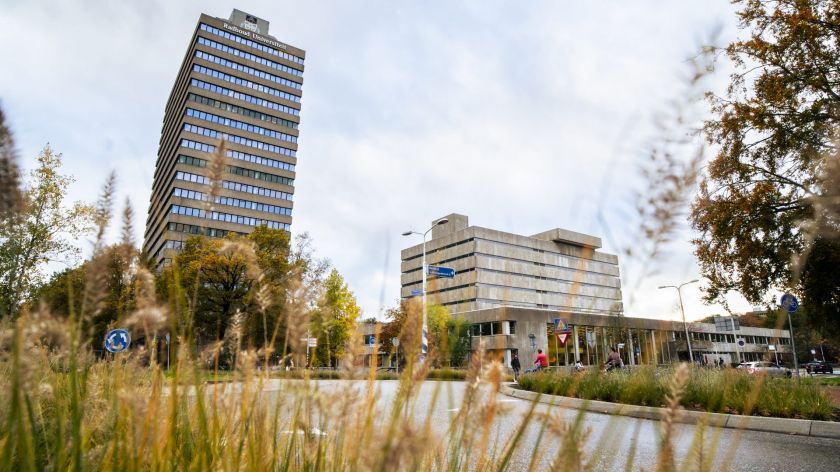Administrators on €20 million savings in operations: ‘Half of the cuts will be on material costs, half on staff’
-
 Foto: Johannes Fiebig
Foto: Johannes Fiebig
Radboud University's support services are being hit hard by the planned cuts. Especially in HR, the number of employees will be reduced, said Vice President Agnes Muskens and Suzanne Boelens, director of the Savings programme. ‘Think roughly 40 FTE over the next four years.’
Like many other Dutch universities, Radboud University is cutting back heavily in the coming years. In response to the expected decline in student numbers, high inflation, and cuts from the central government, the University has to make structural savings of €55 million in the period until 2030. A sizeable portion of this, €20 million, the University plans to save by making its operations more efficient.
Operations
Business operations refer to the professional services that facilitate teaching and research at Radboud University within the faculties and Radboud Services, such as the HR departments, Marketing & Communications, Information & Library Services, Campus & Facilities, and research and teaching support. This does not include support staff at the Faculty of Medical Sciences: they are employed by Radboud university medical center.
Saving on business operations is a conscious decision, says Vice President Agnes Muskens: ‘We want to spare teaching and research as much as possible. Because that is really our primary task. And we know there are savings opportunities in operations. Partly because of the way things are set up at our University, at both central and decentralised level, but also because we did not digitise enough yet.’
Savings potential
For four columns, the contours of the savings are slowly coming into view. For example, the Human Resources (HR) column has to save €4.5 million, and Housing and Facilities (H&F) and Information & Library Services (ILS) have to save €6 million each. Marketing & Communications staff also heard recently that they have a savings order of €1.8 million.
‘We looked at the savings potential for all columns by conducting a benchmark (a study comparing the performance of similar organisations, Eds.),’ says Suzanne Boelens, director of the Savings programme as well as Administrative Director at the Faculty of Social Sciences (FSW).

‘In this benchmark, experts from the field examined our organisation from an external perspective. For example by looking at how we have set up our HR department compared to other universities and organisations. How many people do we have on the team, for example, and how is this done elsewhere? Where can we digitise even more, what tools do we see in the market that we can use to improve our services?’
Following that study, Boelens says, it was decided that the University could save €20 million on operations. ‘That is about 15% of the total operating costs. Based on that benchmark, it was also decided what could be saved per column. For two columns – HR and ILS – we also already further identified where we can make savings. For these columns, we are now entering the phase in which the plans actually have to be implemented.’
Why did you start with the ILS and HR columns?
Muskens: ‘We decided to vet no more than two columns at a time because it takes people a lot of time. We chose the HR column because everyone interacts with it almost daily. Moreover, there was a general feeling among HR staff that a lot of manual, duplicate, and non-identical work was being done. Some processes are carried out slightly differently within each faculty and department. That is not efficient.’
‘The i-column is complex in composition and very important for implementing improvements and savings for the other departments, because we want to further digitise and automate operations and work in many places.’
HR needs to save €4.5 million; what will you be cutting back on?
Boelens: ‘In each column, we make savings choices based on hypotheses that we first present to a number of employees. These are the managers, but also people who actually do the work on the ground. An example of such a hypothesis in HR is: in which processes can we do less manual work and digitise more?’
‘For example, as a supervisor at the Faculty of Social Sciences, you have to fill in a web form for every employee who is joining, leaving, being promoted, or working more or fewer hours, and send it to the HR department by email. They then type the form into the system. At the Faculty of Social Sciences alone, that form has to be retyped 6000 times a year. While there are tools that can do it much faster.’
‘In the coming months, we will focus on bundling and harmonising these kinds of administrative processes. We will offer these services by combining HR teams under a single direction. We are also aiming for more self-service by staff through the Bass-HR system.’
Less manual work, does that also mean fewer people?
Boelens: ‘HR costs are mainly personnel costs. So that €4.5 million is in large part a reduction in FTE. A rough indication – depending on the material costs – is that we are looking at a reduction of approximately 40 FTE over the next four years; we are tackling this in phases. We try to rely as much as possible on natural turnover.’
How many HR staff members do we have now?
Boelens: ‘About 110 FTE. Professional services, the support functions as a whole, now amount to approximately 1,600 FTE. And the turnover per year is about 5%: these are people who retire, leave, etc. To realise that €20 million, about half of the cuts will have to be in material costs. That means buying less and smarter, looking closely at building maintenance, things like that.’
‘The other half will be saved mostly by reducing FTE. At a turnover rate of 5% a year, we’re talking about 80 FTE a year. We want to cover as much of the savings as possible with this natural turnover.’
Does natural turnover also mean not renewing temporary contracts?
Both: ‘Yes.’
This is also causing unrest and grief in departments.
Muskens: ‘The fact that people are feeling insecure about their jobs is of course very painful. These things are also happening at other universities, so we are not unique in that respect. But that might make it even more difficult for people, since it also means that there are fewer jobs elsewhere.’
‘Yet you do see now that at both Radboud Services and also within the faculties, where new vacancies are really being deployed very sparingly, the costs are decreasing.’
Will some people be told that they are surplus to requirements?
Muskens: ‘We really can’t answer that at the moment. We are hoping that natural turnover will suffice, but we cannot rule it out either.’
Isn’t HR especially needed in this day and age, with contracts not being renewed, positions changing and some people losing their jobs? Is cutting back on this service wise?

Muskens: ‘We have certainly taken this into account. The positions that are now being bundled mainly consist of operational work and lend themselves well to standardisation. We are mindful of maintaining sufficient capacity within HR to manage the organisational changes in the coming period. And we are also aware that this may increase workload for other individuals within the organisation.’
Boelens: ‘We try to take this into account by prioritising. For example by no longer meeting every week, but every fortnight.’
Housing & Facilities and Information & Library Services are both being asked to save €6 million euros. With HR, a significant part of the savings is in personnel; is the same true of ILS and H&F?
Muskens: ‘No, at ILS, the focus is much more on saving on material costs, such as general management costs, IT costs, service hardware, and applications. For example, we have quite a few applications that we can really rationalise a lot more. And with the housing column, in addition to savings, the costs are also in the buildings.’
So in these columns, people do not have to fear so much for their jobs?
Muskens: ‘Here, too, we try to avoid compulsory redundancies as much as possible. We are committed to downsizing, digitising, standardising and absorbing as much as possible with natural turnover. That is really our guiding principle.’
Boelens: ‘But we cannot rule out compulsory redundancies.’
That uncertainty makes the situation very tense for employees. When will there be clarity?
Boelens: ‘The planning is that if we really have to implement reorganisation plans for HR and ILS, they will be in place before the end of the year. But then you still have to go through the whole decision-making process. So for those columns, I expect clarity in the spring. But I hope that by the end of this year, for the columns discussed, we will be able to indicate which teams or departments this applies to. But it is not certain yet.’
It was announced in the spring that funding for the Honours Academy may stop fully or partly in 2027. Is there more clarity on this yet?
Muskens: ‘No.’
Why not?
Muskens: ‘As part of the new strategy, we are exploring how we want to design innovative teaching methods for Radboud University in the coming years. Decentralised or not? We cannot comment on this right now.’
But in the meantime, these employees have been in limbo for a long time. And they cannot respond to internal vacancies for redeployment candidates either.
Muskens: ‘Yes, that is indeed very upsetting. This is where the savings initiatives and building our new strategy come together. We realise that it involves a lot of uncertainty. But we want to be thorough.’
‘In total, we need to save more than €20 million: in addition to cuts, we also need investments’
Could the upcoming year also become extra expensive because the University may have to buy out people who are declared redundant?
Muskens: ‘If we are forced to let people go, we will follow the agreements we made in the social plan.’
How much will that cost?
Muskens: ‘We are obviously looking at what the possible amounts could be if that happens. But we are not there yet.’
The Marketing & Communications department also investigated its saving potential this summer; is there any more clarity there?
Boelens: ‘This department needs to cut €1.8 million. Employees have since been informed about this, but the exact details are not yet clear.’
When you add up all the cuts in HR, ILS, H&F and M&S, you arrive at a figure of €18.3 million. That’s almost €20 million: are you almost there with the cuts?
Boelens: ‘Not quite, the total amount will have to exceed €20 million. The reason is that, in addition to cuts, we also need investments. If you want to digitise more, there will have to be more or different systems, for example. And there will always be something that does not work out as you’d hoped. So you always need a bit more space.’
‘We are not on the brink of a financial precipice; we are financially stable and strong’
Muskens: ‘We have been making savings in many ways for quite some time now, and this is also paying off. We are happy about that. To the extent that you can be happy about savings. We are not on the brink of a financial precipice; we are financially stable and strong. As a collective, we want to ensure that we continue to maintain a robust financial situation for Radboud University.’
Why does Radboud University need to make cuts? Because we expect declining student numbers in the coming years, government funding for all universities is decreasing. Also, the wage costs have gone up sharply in recent years, and inflation is making itself felt. To top it off, the new cabinet wants to severely cut back on higher education, up to almost €1 billion a year. You can read more about it in this file.



